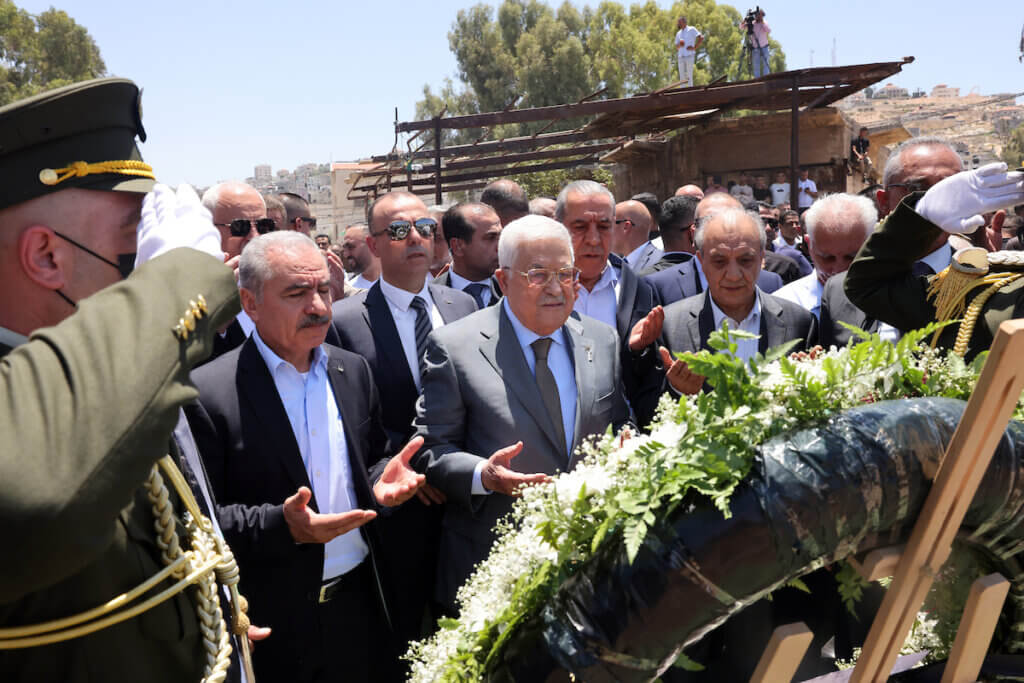On Wednesday, July 12, acting Palestinian Authority president Mahmoud Abbas and several PA security chiefs, including the secretary general of the Palestinian Liberation Organization’s Executive Committee, Hussein al-Sheikh, and head of General Intelligence Services, Majed Faraj, flew into Jenin in a Jordanian-operated helicopter.
A delegation headed by Prime Minister Mohammad Shtayyeh, Minister of Interior Ziyad Hab al-Reeh, and the governor of Jenin, Akram Rjoub, welcomed the PA president and his retinue, continuing onto a tour of the Jenin refugee camp after placing flowers on the graves of Jenin’s martyrs, many of whom were killed by Israeli forces during the recent massive military invasion of the camp.
According to the official spokesperson of the presidential office, Nabil Abu Rmeileh, the purpose of the visit was to assess the size of the damage following the Israeli assault, which was the largest and most devastating that the camp has seen in two decades. Abbas’s visit also comes on the heels of an earlier delegation to the camp by almost 80 Fatah representatives on July 9.
Accompanying the 87-year-old acting president, whose term expired 14 years, five months, and 28 days ago, was a parade of armed Palestinian Security Forces, who flooded the streets of Jenin city and the Jenin refugee camp ahead of the visit. According to residents of the camp and local journalists, armed forces were also stationed on rooftops and throughout neighboring towns, while several dozen men in civilian clothing were dispatched to stand among the crowds receiving the PA’s acting president — perhaps in an attempt to ensure that he was met with a cheering crowd rather than the silent resentment of a refugee population that was left to fend for itself.
For Palestinians in Jenin and Jenin refugee camp, the visible presence of such a large number of armed security personnel only added salt to the wound, as resentment has been building towards the PA over the past two years due to its role in continuing security coordination with Israeli forces during its year-and-a-half onslaught on Palestinian resistance groups, knowns as “Operation Break the Wave.” That resentment came to a head in the aftermath of the latest deadly two-day invasion of the camp — as Israeli forces withdrew, Palestinians in Jenin clashed with PA forces, accusing them of “collaboration” with the Israeli occupation.
This inaugurated a different kind of battle in the camp, one fought over the legitimacy of the Palestinian Authority and its foothold in Jenin. A Fatah-led delegation to the camp was kicked out by mourners during the funeral of the Jenin operation’s 12 martyrs, with chants of “out with the PA” echoing from the mourners. In the following days, however, several other Fatah delegations made a point of returning to meet with members of the Jenin Brigade and went on a tour of the camp — a transparent attempt at reestablishing the PA’s presence while laying claim to the narrative of national steadfastness by associating itself with the camp’s heroism in repelling the Israeli aggression.
‘They kill you, then come mourn at your funeral’
In two days, ten Palestinians were killed, thousands were injured, and 130 were arrested en masse. Entire water and electrical grips were shut off, and the infrastructure of the already impoverished refugee camp was destroyed as D-9 bulldozers ripped up the streets and turned the camp into a warzone. According to the Palestinian Prisoners Club, at least several dozen of the detainees were sent to administrative detention — meaning they were imprisoned without charge or trial.
For the residents of the refugee camp — the thousands that had to flee and the thousands more that remained entrapped during the two-day military operation — the sentiment that many of them reflected can be gleaned in the question that kept arising during Abbas’s visit: “where were these representatives and security forces when we were being slaughtered?”
Ever since the demilitarization of the West Bank following the Second Intifada, the only officially armed Palestinian force became the PA’s security apparatus. Anyone who carried a weapon in the West Bank that was not registered with the PA — and hence approved by Israel — was considered a terrorist at risk of becoming wanted by Israel at any moment.
Yet those armed personnel, ostensibly tasked with defending the security of the Palestinians they claimed to represent, stood idly by over the past two years as Israeli forces left behind a trail of Palestinian blood. Those who resolved to defy the onslaught were those wanted resistance fighters who armed themselves due to PA inaction in the face of uninterrupted settler colonial expansion.
And when those Palestinian resistance groups were besieged in the Jenin refugee camp last week, Palestinian security forces in Jenin were given orders to stand down, as they have always done during previous invasions of Palestinian cities. Meanwhile, Jenin governor Akram Rjoub — who has a home in Ramallah — was on vacation as the camp withstood the Israeli offensive.
Yet what ultimately continues to wedge a gap between the PA and the Palestinian population has less to do with the PA’s paralysis and inability to protect its people as it does with the Security Forces’ proactive engagement in attacking and weakening Palestinian society and Palestinian resistance groups — from its constant crackdown on political opposition to its silencing of dissidents to its arrest of resistance fighters in Nablus last September, and even to arresting Jenin resistance fighters on the eve of the recent Israeli invasion and in the months leading up to it. Indeed, during the hour in which Abbas was flying from Ramallah to Jenin, a sit-in was being held outside Bethlehem’s PA headquarters protesting the continued imprisonment of Sheikh Jamal Hamamra, a local leader in the Palestinian Islamic Jihad (PIJ), by Palestinian Intelligence Units. Hamamra would later be released on July 13, according to Saraya al-Quds, the PIJ’s military wing, but it continues to detain a number of PIJ fighters from Jenin, Tulkarem, Nablus, and Hebron.

‘Ramallah will not see freedom yet’
On July 6, the Jenin Brigade released a statement condemning the recent arrests. “It is heartbreaking that we are being fatally stabbed in the back by our own people, the PA security services, which committed an act on Tuesday that no fighter or defender of this land would accept,” it read.
Yet, in spite of the undeniable antagonism between the PA and the Palestinian resistance, Abbas issued a statement following his tour of the camp, hailing it as an icon of resistance across the world. The Palestinian Authority’s president continued to affirm that the Palestinian leadership will not accept any assault on its people, asserting that Palestinians will remain steadfast and patient.
But the visit was not met with the animated welcome that would be expected of a presidential appearance. Indeed, before the acting president was able to finish his speech, a crowd in the distance could be heard chanting over him, “kateebeh, kateebeh” — literally, “brigade,” in reference to the Jenin Brigade, the resistance group that defended the camp and claimed a tentative victory against 1,000 of the Israeli army’s most elite troops.
One of the Jenin Brigade’s now-martyred resistance fighters, Nidal Khazem — who was assassinated on March 16 — recounted how the PA tried to eventually suppress the Jenin Brigade in an interview with Mondoweiss in October 2022. “The PA tried to quell us, they offered us many things, even offered them to me,” he told Mondoweiss. “But I refused. I chose a path, and I have stuck to it ever since.”
That path led Nidal Khazem to his death. A few days after his assassination, Mondoweiss interviewed his grieving father, Amin Khazem, who is affiliated with Fatah.
“I say it with such shame now,” the bereaved father had said of his factional affiliation in the interview.
“Curse them, and curse the weapons they have,” he said, referencing the PA’s armed forces. Later, Amin would write a post on his Facebook page addressed to the PA: “Your headquarters only works for the preservation and service of the occupation,” he wrote. “Nidal will not forget.”
Nidal’s interview in October echoed the same sentiment. “Do you see Ramallah? Ramallah will not see freedom yet,” he told Mondoweiss. “Ramallah needs a long time. As long as you have the PA in Ramallah, [resistance and liberation] won’t come from there.”
 RSS Feed
RSS Feed















 July 15th, 2023
July 15th, 2023  Awake Goy
Awake Goy 
 Posted in
Posted in  Tags:
Tags: 













